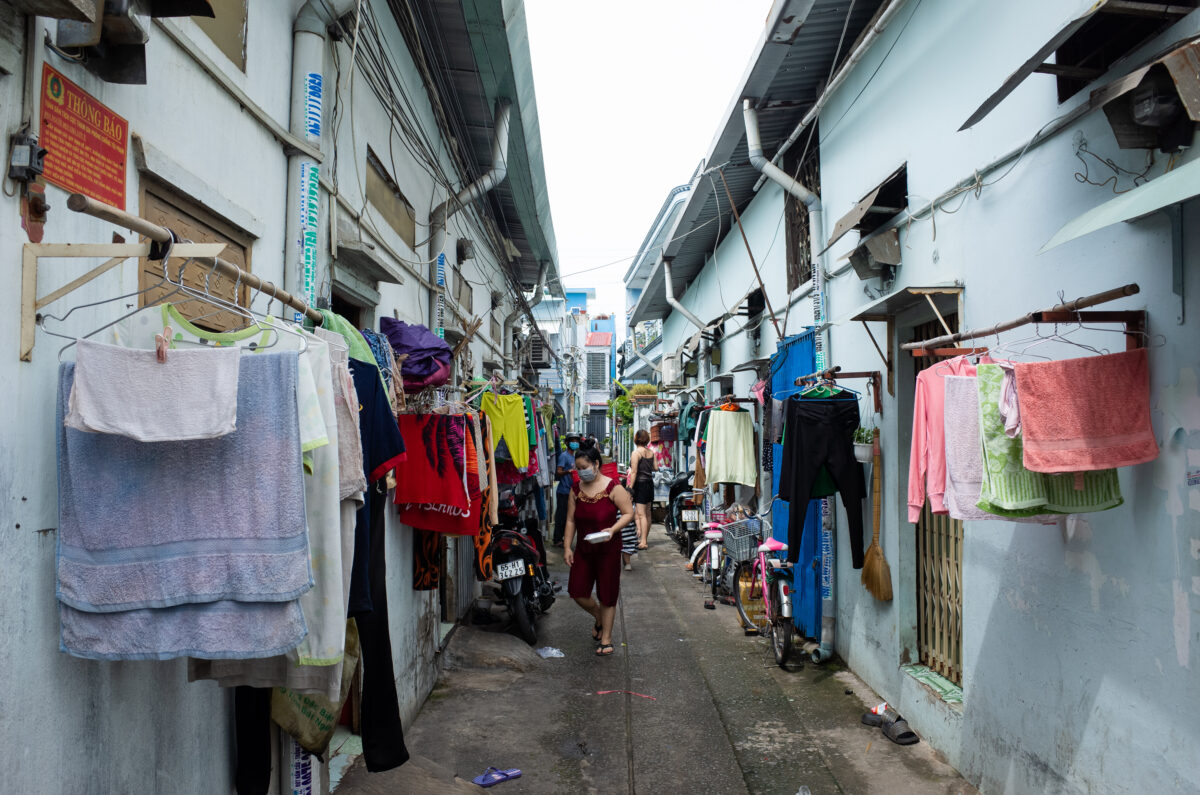HỒ CHÍ MINH CITY, VIỆT NAM – Every weekend, workers at Adidas supplier Pouyuen swap their hairnets for vendor hats. Facebook groups then turn into online bazaars, teeming with sales posts of ready-to-eat meals, vegetables, fruit, snacks and sweets.
These side gigs that started as a way of coping with the reduced hours and layoffs during the Covid-19 pandemic have now evolved into full-time commitments for many of these workers, most of them women.
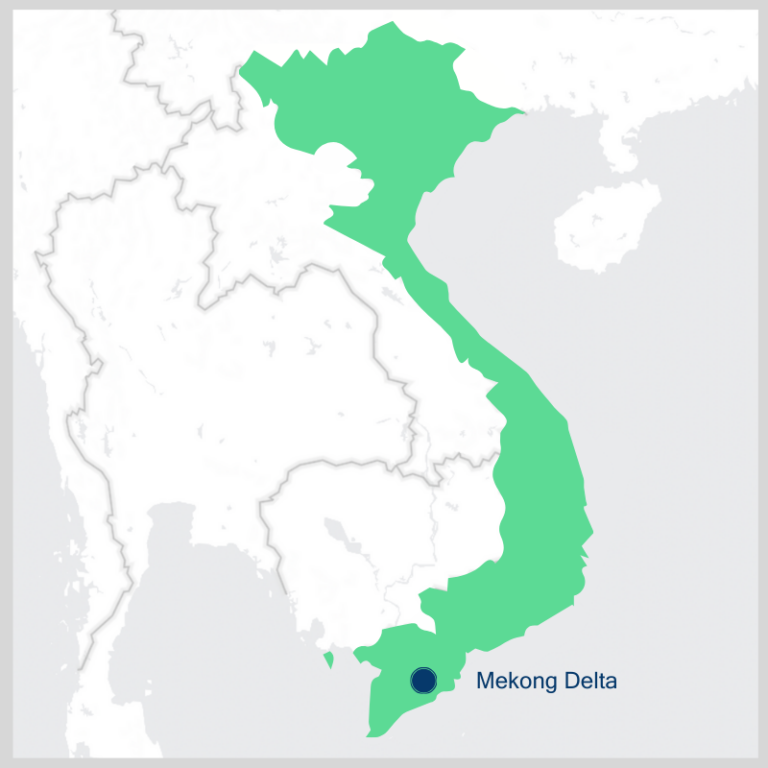
Trần Gia Linh is one example. She worked at the Taiwanese factory for 11 years, but now sells packaged tamarind and cashew nuts online.
The 34-year-old left home for factory life in her teens, tired of earning meager pay as a farmhand in the Mekong Delta. During the pandemic, facing hours cut and layoff threats for women her age, she contemplated returning home for the first time.
“What work is there [back home]? There is shrimp farming, but many are deep in debt because the unstable weather often leads to disease outbreaks,” said Linh. She quickly dismissed the idea after seeing many of her coworkers returning to the city after failed ventures in the delta.
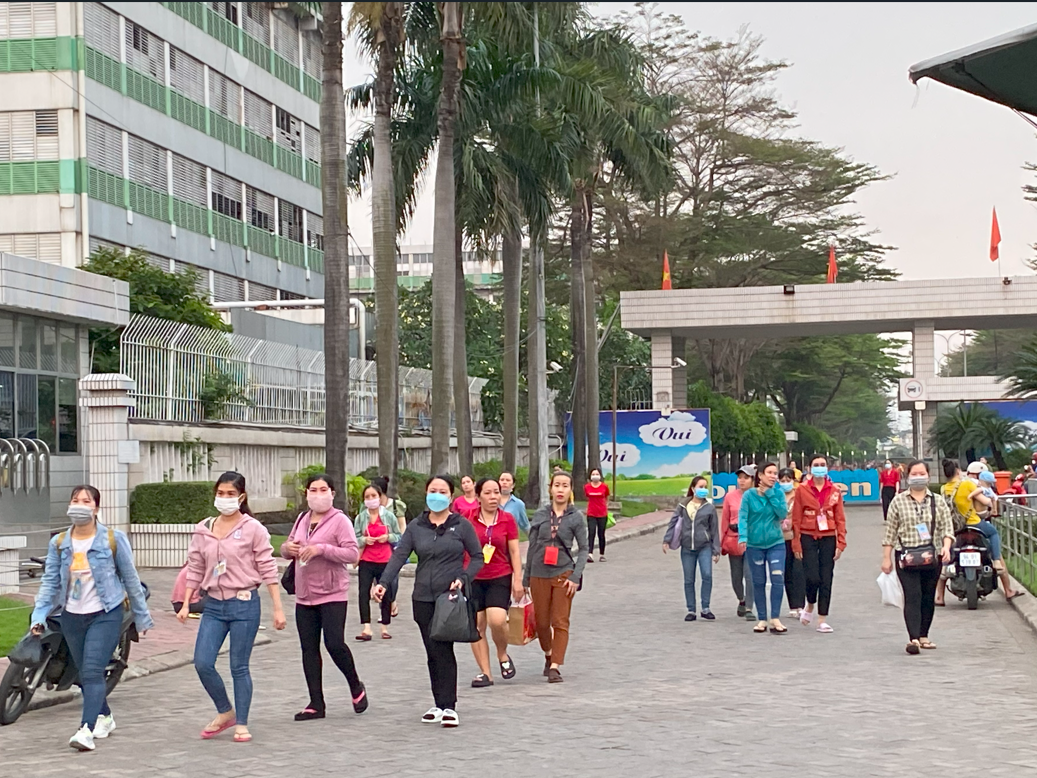
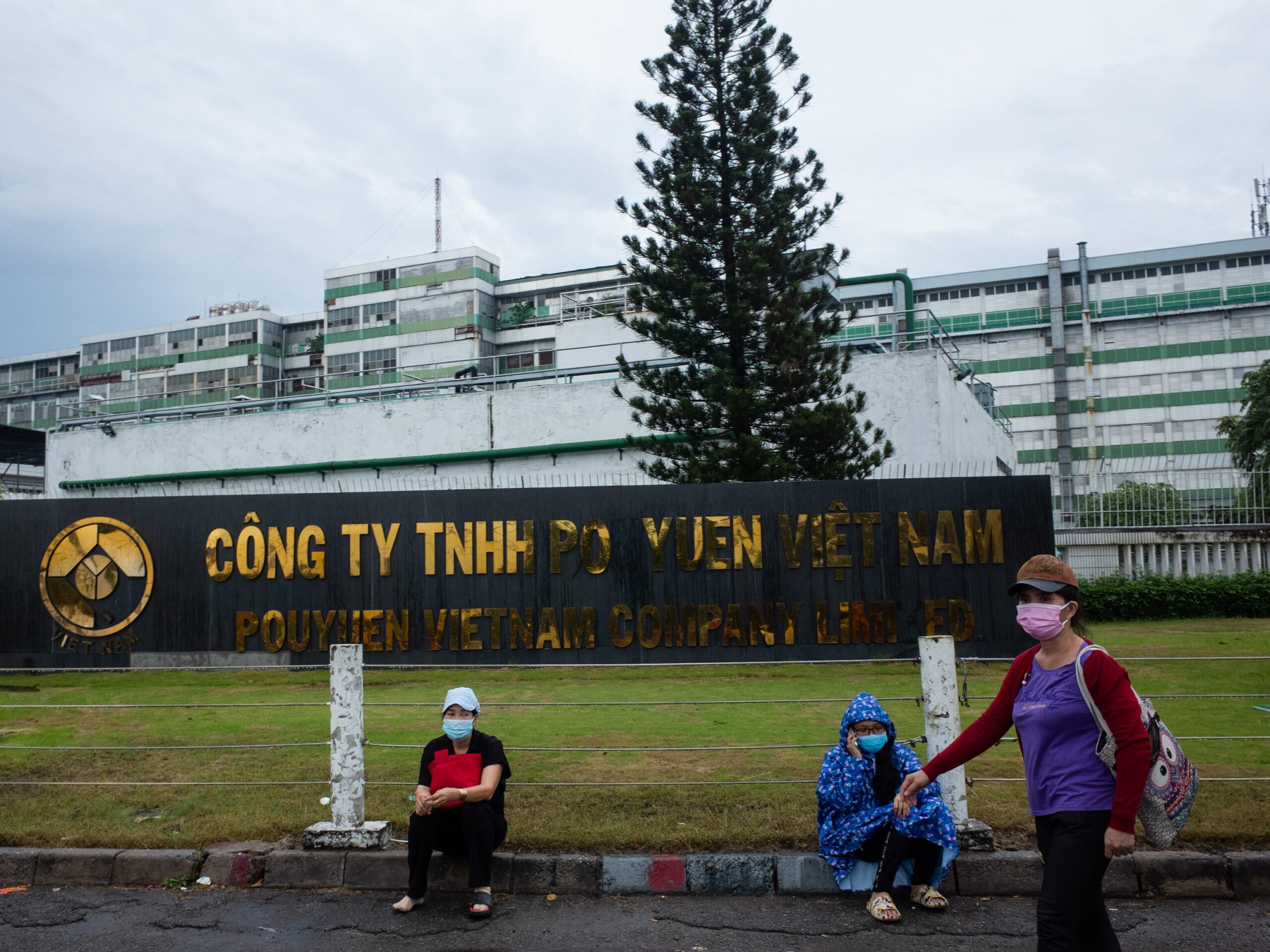
By the end of 2022, amidst mass layoffs with half of the affected workers being women over 40, Linh quit. The 34-year-old invested her entire 120 million VND (US$4,850) social insurance payout into her online side business.
“I figured I would be let go eventually, so I quit to take matters into my own hand,” Linh explained, adding that she was confident because of her large clientele both inside and outside the industrial zone.
Linh was one of the hundreds of thousands of migrant labor in the manufacturing sector who suddenly found themselves at a crossroads. Within the first five months of 2023, 280,000 factory workers were either laid off or quit, 36% of them garment and footwear workers.
More than 8,600 businesses scaled back, 27% of which were FDI firms and the majority were located in the Mekong Delta. Downsizing is often associated solely with the recent economic downturn, but it is also driven by automation and factories’ preference for young workers.
Yet few of the women workers have the business acumen and savings like Linh. Many migrant factory workers from the Delta, especially women over 35, are between a rock and a hard place.
If they choose to stay in the city, years of monotonous assembly tasks have not prepared them for the increasingly competitive labor market. Returning to the Delta, though many who spoke to Mekong Eye wished to do so, is no less risky as their hometowns face various environmental challenges, which prompted their migration in the first place.
“Imagine in a few years, there will be tens of thousands of people aged 40, with no savings, poor health and insufficient skills for the labor market,” said Nguyễn Đức Lộc, Director of the Social Life Research Institute. “Without supportive policies now, a social crisis is bound to occur.”
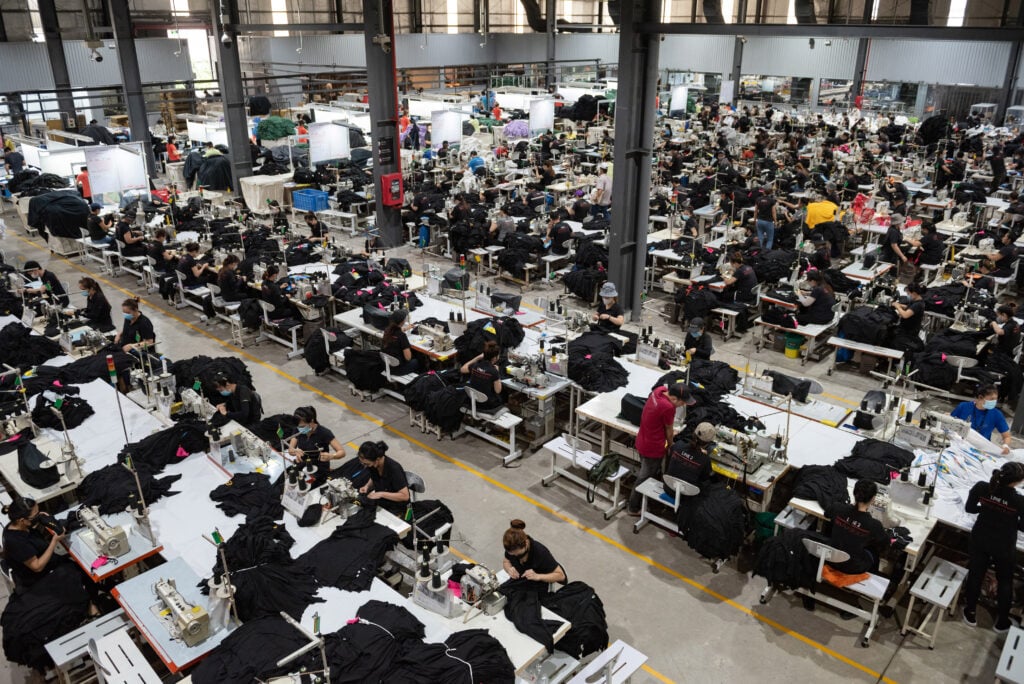
A looming crisis
Unlike Linh, the thought of returning home never crossed Đào Thị Kim Ngân’s mind, even when she was anxious about getting laid off. The 41-year-old could not forget her relatives’ salinized, barren rice fields in Bến Tre, one of the provinces hit the hardest by saltwater intrusion in the Delta.
“Saltwater from the river crept into the ditches near the field and then spread to the whole field when the rice was flowering,” Ngan recalled. “Not a single plant survived. We had to feed it to cows.”
Although she still has her job, Ngan has been concerned for the past year, as female workers over 35 are usually the first to be laid off.
“The company is recruiting thousands of new workers. I’m afraid they will kick me out once they’re done with recruitment,” Ngân told Mekong Eye. “I am already middle-aged, and the only way to deal with this is to start something of my own or work as a maid in the city. No one, not even factories in my hometown, will hire me.”
According to labor experts, most workers from the Delta have low education levels and spend their entire youth earning meager minimum wages. After years of monotonous tasks in factories, they often struggle to acquire the new skills demanded by the current labor market.
“The majority of people who have been laid off or are facing this risk still struggle to find alternative jobs in urban areas. Only when they have no other choice do they return to their hometowns,” said Trần Hương Giang, a public policy researcher.
The Mekong Delta has the second highest unemployment rate in the country, according to a 2022 study which Giang contributed to. Demands from the industrial sector are now modest due to sluggish growth, while agriculture faces various environmental challenges such as saltwater intrusion, soil depletion and landslides.
A host of factors affect the Delta’s increasing inhospitality, including the construction of upstream hydropower dams along the Mekong River, sand mining, extensive irrigation systems and the impacts of climate change.
“Transboundary water fluctuations have undermined economic opportunities, driving migration from this area to southern urban centers, with little opportunity for reverse migration,” Giang explained.



Outplacement assistance
Although the Vietnamese government has made efforts to help workers prepare for their post-factory life, the picture on the ground is far from rosy.
The country’s labor code mandates that companies must provide outplacement services such as training female workers with occupations that are “suitable to women’s physical, physiological and maternal characteristics.” Several companies have abided by hosting classes in beauty services, cooking and foreign languages.
However, a leader at a local NGO based in Hồ Chí Minh City that provides support for factory workers, who wished to speak anonymously, revealed that most companies are not under pressure from the government to comply with the law.
“It seems that only those engaged in outsourced manufacturing for global brands adhere to this,” he said. “They [the vocational training classes] are not suitable for many workers either.”
Most of the 20 workers interviewed by Mekong Eye said they were often too exhausted to attend these classes after their official working hours and overtime. Some were skeptical about the potential of the new jobs, while some simply did not feel compatible.
“The company opened a free hairdressing course, but we workers could not go to class after official working hours and stressful overtime. Moreover, this type of job is not suitable for my age,” Ngân said.

Lacking the skills of her tech-savvy younger colleagues, Ngân desires to open a clothing repair shop. The idea is overwhelming, as she had never sewn a complete shirt after 20 years on an assembly line making Nike and Adidas shoes.
These days Ngân spends every night in a 12-square-meter bedsit with only one window, doing outsourced sewing and clothes processing tasks from local garment factories. Though she is still unsure about this career move, she hopes to earn an extra income while forming connections with factory owners, so she has a backup job to support her three children in case of a layoff.
“In the meantime, I have to try to endure factory life and avoid upsetting the manager, so I can remain here for a few more years,” said Ngân.
Lê Thị Chi dropped out of school in the 9th grade and spent 14 years at garment and footwear outsourcing factories in Hồ Chí Minh City and Bình Dương. A few years ago, she thought about attending free vocational training classes, hoping to secure a stable job.
“In my hometown, Tiền Giang, factories are booming, but I’m hesitant to return to factory work. However, I also lack the qualifications to pursue other positions in the city,” said the 32-year-old single mother. She sets aside the idea of learning a new trade offered at her current company, as the only available courses are in beauty, a skill she feels she lacks talent for.
“Everyone learns this trade and returns to their hometown to open a salon, making competition fierce,” she added.
“I just hope that if I get fired, it will be now, while I’m still young enough to have other opportunities,” Chi added.

The future of cheap labor
According to Nguyễn Đức Lộc, many workers have visions for their post-factory jobs, including startup ideas in their hometowns, but they often lack the resources to implement them, such as funding, consultation and industry connections.
“What to do after leaving the factory? That is no longer just a question solely for the workers, but a significant question for Viet Nam after more than three decades of attracting foreign direct investment through cheap labor,” emphasized the labor expert.
Employers are not incentivized to support workers they fire if Viet Nam’s labor laws and the brands do not strictly mandate this, said the leader of the local labor NGO.
During last year’s layoffs, the Vietnamese government not only asked state agencies to devise solutions to support unemployed workers, but also asked companies to reconsider their downsizing plans.
However, these efforts appear to be “too little and too late,” said Nguyễn Khắc Giang, a visiting fellow at the ISEAS-Yusof Ishak Institute.
“Widespread layoffs of women over 35 stems from the structural challenges of an export-led economy reliant on cheap labor, a trend that cannot be swiftly reversed,” he added.
“Despite this, the government can facilitate smoother transitions for these workers by providing opportunities for them to acquire new skills relevant to alternative employment options, encouraging the establishment of small businesses, and rigorously monitoring manufacturers to ensure compliance with regulations and fair compensation for workers after redundancy.”
Linh’s online business faces increasing competition as the number of online food stores has grown rapidly in her area. Withdrawing social insurance means forfeiting her state old age pension, but for now she remains steadfast in her decision, despite the risks.
“My factory salary of less than 6 million VND ($242) per month was not enough for me to raise my children. As prices escalate, I don’t believe I can rely on my pension in the future,” said Linh. “We workers need to find another brighter path.”


